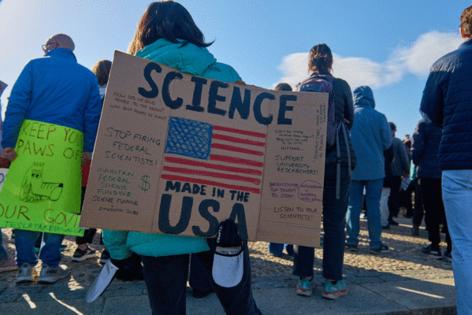Commentary: What scientists need to do to save science
Published in Op Eds
It has become a point of discussion and lament amongst science researchers that science is under attack. What was once considered a noble undertaking appears to be under attack by the current administration, as federal funding at numerous other universities are being threatened.
Yet the situation faced by science researchers did not occur in a vacuum. In truth, many were complicit with and contributed to the current state of affairs.
Though science researchers have been viewed with skepticism for some time, the COVID pandemic forced some into a public position that they were ill-prepared for. In general, making time-constrained, real-time decisions in public view exposes how imprecise and messy scientific research can be, even when the final products may come out clean and elegant.
An implicit assumption that science would get public health interventions and policies right the first time was both unrealistic and naïve. Non-pharmaceutical interventions like social distancing and face masks were viewed as inappropriate, perhaps even contradictory by some, with politics contributing to many decisions. The result was a precipitous drop in confidence in science, particularly biomedical research, and the people who conduct it.
Science touches everyone’s life. The smartphones that people rely upon, the medications that their physicians prescribe, and the vehicles that they travel in are all products of scientific research and technological advances.
Science plays a critical role in improving the well-being and comforts that we all enjoy. Without government support from the National Institutes of Health and the National Science Foundation (NSF), many advances would never have occurred, or if they did, would have taken much longer to be revealed. Examples include 3D printing, the internet, and LASIK surgery, to name just a few. Numerous Nobel Laureates trace their foundational research back to support from NSF and other government agencies.
The problem faced by science researchers is not with what they do, or even how the work benefits society. As the COVID pandemic demonstrated, it is how they communicate their findings and processes with the public.
As social media has grown into a pervasive source of siloed news and unvetted information, the need for better communication from within the science ecosystem, and stronger touchpoints between scientists and the population, has never been greater.
Working in biomedical, science, or computer research laboratories demands intense focus. The popular television sitcom, “The Big Bang Theory”, illustrates the peculiar nature and idiosyncrasies of science researchers. Such personalities are ubiquitous in academic, industry, and government research labs, even as the television program exaggerated their personality quirks.
Yet staying in a cloistered research environment carries risks. NSF’s Office of Legislative and Public Affairs showcases the value of NSF supported research and the benefits accrued by taxpayer dollars. NSF also requires that all proposals address societal benefits, labeled Broader Impacts. One such example is Public Engagement, defined as “Increasing public scientific literacy and public engagement with STEM.” The problem may be the implementation of this ideal and its translation into practice.
Science researchers are incentivized by what it takes to get their research funded. This has been my personal experience as a person who has received numerous NSF grants during my career as well as while working as a NSF program officer making decisions about which proposals would be funded. The Broader Impact components that provide the path of least resistance are typically followed. When researchers ignore the public engagement component, the schism between academic research and the public grows wider. If researchers hold an attitude of “someone else will do it,” then often “no one will do it.”
Achieving a critical mass of science communicators is necessary during these volatile and rapidly changing times. Such efforts should demand attention across both social and traditional media. They demand attention via podcasts, reaching people across all sectors of society. Even having science researchers join programs like the Joe Rogan Experience podcast would be worthwhile.
Naturally, not all science researchers are prepared to tackle such endeavors. Some will remain confined within their research labs, doing good work and advancing science for the greater good. In the current environment, some will move elsewhere, as funding sources dry up domestically.
Yet more researchers are needed to embrace public engagement. Without such efforts, science researchers will continue to face headwinds that will make it harder to justify their very existence and livelihoods.
Indeed, in today’s environment, doing good work with societal benefits may be necessary, but not sufficient.
Moreover, if science communication by scientists does not occur, the void is invariably filled by those less qualified, and perhaps, with agendas that may undermine good science. This occurred during the COVID pandemic, when alternative treatments and cures were put forward, all of which proved to be ineffective. It is also true today with the indisputable public health benefits of vaccines.
It is said that the best time to plant a tree is 20 years ago. The second-best time is today. It is time for science researchers to plant a forest of trees in the domain of public engagement.
Tearing down the barriers between science research and the public is necessary to ensure that such advances can continue into the foreseeable future. Science communication is critical to build bridges that shine a bright light on how and why science makes sense. Scientists are heroes in the current “war on ignorance,” ensuring that new knowledge will make our nation and the world a better place for all.
____
Sheldon H. Jacobson, Ph.D., is a professor in the Grainger College of Engineering at the University of Illinois Urbana-Champaign. He uses his expertise in risk-based analytics to address problems in public policy. He can be found on X at @shjanalytics
___
©2025 Tribune Content Agency, LLC.




























































Comments